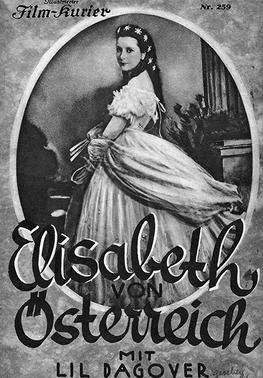Related Research Articles

Magnus Stifter was an Austrian stage and film actor. He appeared in 85 films between 1914 and 1941. He was born in Vienna, Austria-Hungary, and died in Vienna, Nazi Germany.

The Burning Soil is a 1922 German silent film directed by F.W. Murnau. It was made the same year as Murnau's Nosferatu and released in Germany around the same time. The film follows the struggle over a plot of petroleum-rich land.

Ludwig Trautmann was a German stage and film actor. He appeared in more than 60 films between 1912 and 1953. He was a member of the jury at the 1st Berlin International Film Festival.

Elisabeth of Austria is a 1931 German historical drama film directed by Adolf Trotz and starring Lil Dagover, Paul Otto, and Maria Matray. It is a biopic of Empress Elisabeth of Austria. It was shot at the EFA Studios in Berlin with sets designed by the art director Franz Schroedter.

I.N.R.I. is a 1923 German silent religious epic film directed by Robert Wiene and starring Gregori Chmara, Henny Porten, and Asta Nielsen. The film is a retelling of the events leading up to the crucifixion of Jesus Christ. It was based on a 1905 novel by Peter Rosegger. It was reissued in 1933 in the United States with an added music track and narration as Crown of Thorns.
The Conspiracy in Genoa is a 1921 German silent historical drama film directed by Paul Leni and starring Wilhelm Diegelmann, Maria Fein and Fritz Kortner. It is an adaptation of the 1783 play Fiesco by Friedrich Schiller.

Othello is a 1922 German silent historical romantic drama film directed by Dimitri Buchowetzki, and starring Emil Jannings, Werner Krauss and Ica von Lenkeffy. It was based on William Shakespeare's play The Tragedy of Othello, the Moor of Venice, the first of six major film adaptations of the work. It was shot at the Johannisthal Studios in Berlin. The film's sets were designed by the art director Karl Machus.

Maria Ilona is a 1939 German historical drama film directed by Géza von Bolváry and starring Paula Wessely, Willy Birgel, and Paul Hörbiger. The film is set in Austria during the reign of Ferdinand I. It is an adaptation of Oswald Richter-Tersik's novel Ilona Beck.
Napoleon's Daughter is a 1922 German silent historical film directed by Frederic Zelnik and starring Lya Mara, Ludwig Hartau and Ernst Hofmann. It premiered at the Marmorhaus in Berlin.
The Man in the Iron Mask is a 1923 German silent adventure film directed by Max Glass and starring Albert Bassermann, Bruno Decarli, and Vladimir Gajdarov. It was shot at the Terra Studios in Berlin. The film's sets were designed by the art director Robert A. Dietrich.
Dora Brandes is a 1916 German silent film directed by Magnus Stifter, starring Asta Nielsen, with a screenplay by Martin Jørgensen, and Louis Levy. Dora is an actress who is involved with a politician, Gustave, as her lover. With money from Dora's former admirer, she decides to help further Gustave's political career. Once he becomes a parliamentary deputy, he achieves his goals and leaves Dora. Dora cannot handle the betrayal and begins to drink and starts on a social decline. Years later, Gustave becomes a minister and Dora returns to his life to help him yet again with his career. Gustave does not accept Dora as a lover again due to her ill past, causing Dora to commit suicide.
The Eskimo Baby is a 1918 German silent comedy film directed by Heinz Schall and starring Asta Nielsen and Freddy Wingardh.

Impossible Love is a 1932 German drama film directed by Erich Waschneck and starring Asta Nielsen, Ery Bos and Ellen Schwanneke. It was Nielsen's final film, and the only sound film she appeared in. It premiered at the Mozartsaal in Berlin. Neilsen had been a major star during the First World War and the early 1920s but her screen career gradually declined and she had not appeared in a film since That Dangerous Age in 1927. Four years after making Impossible Love she returned to her native Denmark. The film is also known by the alternative title of Crown of Thorns.
The White Roses is a 1916 German silent film directed by Urban Gad and starring Asta Nielsen, Ernst Hofmann, Max Landa and Fred Immler.
Rose of the Wilderness is a 1918 German silent film directed by Walter Schmidthässler and starring Asta Nielsen and Curt Goetz.
The Handicap of Love is a 1921 German silent crime film directed by Martin Hartwig and starring Ferdinand von Alten, Magnus Stifter and Hermann Böttcher. It features the detective character Joe Deebs.

Tales from the Vienna Woods is a 1928 German silent film directed by Jaap Speyer and starring Albert Paulig, Magnus Stifter, and Eric Barclay. The title refers to the waltz Tales from the Vienna Woods by Johann Strauss.

The Secret of the Mummy is a 1921 German silent crime film directed by Victor Janson and starring Ferdinand von Alten, Aud Egede-Nissen, and Magnus Stifter. It is part of the Joe Deebs detective series. Originally shot in 1916, it did not go on general release until 1921.
Orient is a 1924 German silent drama film directed by Gennaro Righelli and starring Maria Jacobini, Harry Liedtke and Magnus Stifter. It was shot at the Grunewald in Berlin and on location in Egypt. The film's sets were designed by the art director István Szirontai Lhotka.

Veritas Vincit is a 1919 German silent historical film directed by Joe May and starring Mia May, Johannes Riemann, and Magnus Stifter. It was made as an epic in three episodes, similar to D. W. Griffith's Intolerance. The first takes place in Ancient Rome, the second during the Renaissance and the third shortly before the First World War. Although not released until Spring 1919, it had been made during the final months of the war the previous year.
References
- ↑ Kuhn p. 296